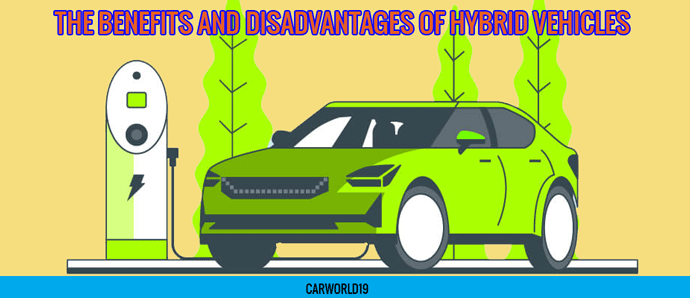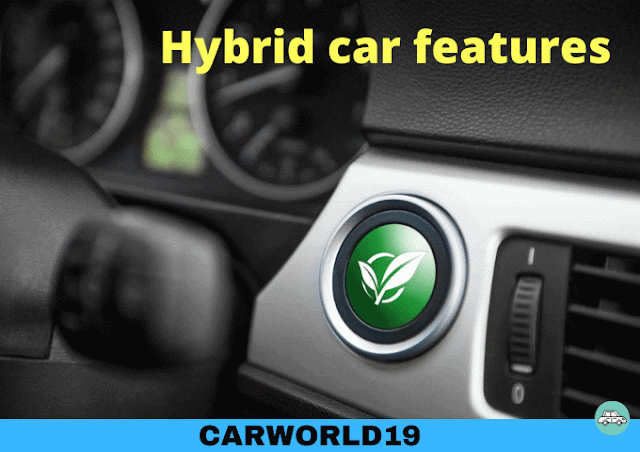Whether you possess a hybrid vehicle or are thinking about buying one, it's vital to understand the benefits and drawbacks of this "green" vehicle choice. Continue reading to learn more.
 |
| THE BENEFITS AND DISADVANTAGES OF HYBRID VEHICLES |
WHAT IS THE DIFFERENCE BETWEEN A HYBRID AND A NON-HYBRID CAR?
Hybrid vehicles (HEVs) usually use two separate propulsion technologies: an electric motor driven by a rechargeable battery pack and a gasoline-fueled internal combustion engine (ICE).
While the high-voltage battery pack powers the electric motors that move the car at lower speeds, the combustion engine provides torque at greater speeds.
There are several distinctions between electric, hybrid, and conventional gas cars, but the combination of an electric motor(s) and an internal combustion engine (ICE) is the most important.
HEVs and plug-in hybrids (PHEVs) differ somewhat. A hybrid electric vehicle (HEV) generally combines an internal combustion engine (ICE) with a high-voltage electric drive system to provide propulsion or propulsion assistance. Regenerative braking aids in battery recharging.
A PHEV is a hybrid electric vehicle with a charging wire that may be plugged into an external electric power source to replenish the battery pack.
In PHEVs, the propulsion strategy takes advantage of the bigger battery to drive the car in full electric mode until the battery is depleted.
When this happens, the propulsion strategy switches to utilizing the remaining battery charge, the ICE, or both to operate like an HEV.
Hybrid automobiles are growing increasingly popular as production costs fall, and they become more accessible to ordinary motorists.
Here are some benefits and downsides to think about when determining whether a hybrid automobile is good for you.
HYBRID ELECTRIC CARS' DISADVANTAGES
1. REPAIR COSTS FOR HIGH VOLTAGE SYSTEMS MAY BE HIGHER
Although hybrid vehicles require less frequent maintenance, they can be costly when they need to be repaired, particularly if the problem is with your vehicle's high voltage system.
Depending on the battery type and the make and model of your vehicle, replacing a dead or damaged high voltage battery might cost thousands of dollars.
Hybrid cars are jam-packed with complicated components, ranging from massive high-voltage battery packs and inverters to electric motors and better cooling systems, in addition to the typical tech placed in ICE vehicles.
Not only may these intricate processes increase the cost of hybrid repairs, but not all technicians have the necessary tools and skills to effectively repair them.
Fortunately, Firestone Complete Auto Care professionals have the skills and knowledge to handle everything from routine maintenance to high-voltage system repairs on hybrid vehicles.
Call today to see whether your neighborhood Firestone Complete Auto Care provides these high-voltage system repairs.
2. THEIR UP-FRONT COST MAY BE HIGHER
You may have to pay a greater price upfront if you move to a hybrid vehicle. Even though the price of this automobile type is decreasing, it is still more expensive than normal ICE alternatives.
Fortunately, tax exemptions and government incentives, as well as lower operating expenses and fuel savings, may be sufficient to offset this initial outlay.
3. IN COMPARISON TO STANDARD ICE VEHICLES, THEY MAY HAVE LESS POWER
Hybrid cars are designed for fewer CO2 emissions and better fuel efficiency, but they are rarely built for racecar-like acceleration and speed.
On traditional automobiles, many of the performance upgrades that affect maximum horsepower are frequently foregone.
Because hybrid cars have two propulsion options, for example, space and size are usually modified. The result is that hybrid vehicles have slower top-end acceleration than conventional automobiles.
THE BENEFITS OF OWNING A HYBRID CAR
1. HYBRID CARS MAY BE BETTER FOR THE ENVIRONMENT
Hybrid variants of the same automobile type provide various "green" benefits as compared to normal gas cars. Making the transition will reduce your carbon footprint in a variety of ways, from reduced emissions to a better gas economy.
Here are a few of hybrid automobiles' environmental advantages to consider while assessing their environmental benefits and drawbacks.
- Greater Gasoline Efficiency: Because hybrid automobiles don't rely exclusively on their gas engines to operate, they may use less fuel. The result: increased fuel economy.
- Reduced CO2 Emissions: Conventional automobiles produce harmful exhaust emissions that harm the environment. Hybrids feature higher fuel economy and energy conservation, resulting in lower carbon emissions.
- Less Fossil Fuel Dependency: Hybrid vehicles rely less on fossil fuels than normal gas automobiles, since they can use a high-voltage battery pack and electric motor(s) for propulsion.
- When you press the brakes in most hybrid cars, energy is created and used to replenish the high voltage battery. This step may lead to a reduction in fuel use.
2. THEY MIGHT BE EASIER TO MAINTAIN
Because hybrid cars employ a mix of a high-voltage battery pack, an electric motor, and an internal combustion engine to move the vehicle, your car's engine may undergo less wear and tear.
Fewer repairs may be required as a result of countering the regular engine wear and tear that might occur with a standard car, and you may have lower overall routine maintenance expenditures.
Note that maintenance expenses vary based on the manufacturer and type of your hybrid.
3. THEIR RESALE VALUE MAY BE HIGHER
More individuals are choosing fuel-efficient automobiles as petrol costs climb and hybrid cars gain popularity. The resale value of hybrids has begun to rise.
If you decide to trade or sell your hybrid automobile, you may be able to get a better return on your investment than you would with a normal vehicle.
4. "RANGE ANXIETY" MAY OR MAY NOT BE AN ISSUE
Range anxiety, or the dread of running out of energy before reaching your destination, is a prevalent issue among battery-only electric car drivers.
Charging stations are already being installed around the United States, but depending on where you reside, they may still be few.
Hybrid and plug-in hybrid drivers don't have to worry about range anxiety. When the high-voltage battery in a hybrid vehicle runs out of energy, the automobile will rely more on the internal combustion engine (ICE).
Because gas stations are more widely available, this automated transfer can be considerably more reassuring.
FIRESTONE PROVIDES HYBRID CAR CARE SERVICES
You don't have to travel to the dealership to acquire the auto care services you need for your hybrid vehicle, contrary to common opinion.
Firestone Complete Auto Care's professionals are up to the challenge! We've got you covered on everything from routine maintenance to high-voltage system repairs (at specified locations). Visit your local facility now, and we'll get your car running like new again.


